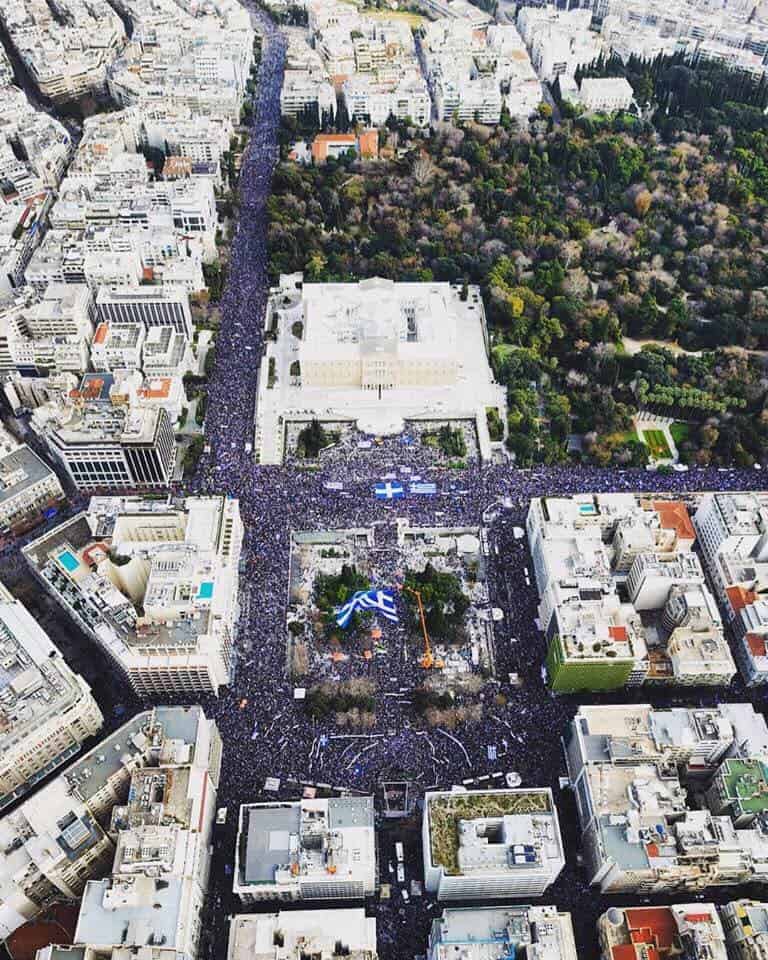
EDITORIAL
With what organisers say was over 1 million and official police figures reporting 140,000 people converging on Syntagma Square in Athens on Sunday, to protest against the inclusion of the term ‘Macedonia’ in the proposed new name for FYROM, it became clear that the Tsipras government has not managed to assuage the fears and concerns many citizens have.
To add insult to injury, the Greek PM was dismissive of the protests, a faux pas that he might pay for in the next elections.
Many would argue that it’s hysterical to argue over the term ‘Macedonia’ given it is already included in the acronym F.Y.R.O.M. (former Yugoslav Republic of Macedonia). True, but the counter-argument is that its use was only transitional, temporary, until a permanent name was found for the neighbouring country. It is this permanency Greeks dread, that’s why they want their politicians to get it right.
Greek Prime Minister Alexis Tsipras and his counterpart Zoran Zaev have been at pains to express a political will to resolve the issue, with the latter making symbolic gestures like renaming the ‘Alexander The Great’ airport in Skopje. But these gestures remain just that, symbolic.
What is needed is a genuine solution that not only protects Greece’s territorial integrity – which most never saw as a real threat – but also protects its cultural sovereignty. For too long FYROM has been engaged in an act of cultural appropriation, kidnapping historical figures of other countries like our own Alexander The Great and mounting him in their capital Skopje, itself a grotesque caricature of post-communist brutalist architecture mixed with neo-classical and other styles. An act of desperation for identity from the previous nationalist government of Gruevski.
Compounding the Problem
We have been told that a compound name will resolve the issue of FYROM’s new name, but what all parties to the negotiations have failed to disclose is what type of compound name: Open or Closed?
Any ‘open’ compound name with geographical indicators, such as Upper Macedonia, Northern Macedonia will be a total defeat for Greece. Why? As many Greeks both in Greece and in the diaspora know for years, no media outlet, no politician or other official will refer to the people of that country as ‘Upper Macedonians’ or ‘Northern Macedonians’. They will be referred to as Macedonians, just as they are now. When was the last time you heard a media outlet referring to them as FYROMians?
For this reason, a closed compound name would be the most desired outcome, a fair compromise for both parties, albeit forfeiting the use of ‘Macedonia’.
The best ‘closed’ compound name that was once put to the negotiating table was ‘Slavomacedonia’, hence ‘Slavomacedonians’, but was rejected by FYROM’s ethnic Albanian population who make up nearly 25% of the country’s population.
Identity
Many Greeks in the diaspora empathise with Slavic people who self-identify as ‘Macedonian’. Many of us in Australia, Canada, the Unites States of America and elsewhere have friends from that region.
It is difficult to tell them they are not who they say they are, given that’s what they’ve been told since birth or 1991 with the dissolution of Yugoslavia.
It is perfectly natural for people to seek a sense of belonging, a history, a culture, an identity.
But please, not at the expense of Truth, Greek history, culture and identity.
Bill Giannakouras,
Publisher

